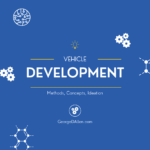Best Practices for Integrating Electronics in Automotive Design

For Integrating Electronics
In the rapidly evolving landscape of automotive design, the integration of electronics plays a pivotal role in shaping the future of vehicles. From artificial intelligence to sustainable technologies, the latest engineering innovations are transforming the automotive industry and leaving a profound impact on society. Therefore, this article explores the best practices for integrating electronics in automotive design, delving into the latest breakthroughs and their practical applications, benefits, and potential challenges.
Artificial Intelligence Revolutionizing Vehicle Occupant Sensing
One of the most significant advancements in automotive electronics is the integration of artificial intelligence (AI) in vehicle occupant sensing systems. AI algorithms are now capable of accurately recognizing and adapting to various factors, such as occupant position, size, and movement. This not only enhances safety by optimizing airbag deployment but also contributes to a more personalized and comfortable driving experience. Furthermore, adopting the System Engineering methodology will create new Best Practices for the Vehicle development process.
Sustainable Technologies Driving Green Mobility - New Best Practices
As the automotive industry shifts towards sustainability, electronic systems are increasingly designed with energy efficiency and environmental impact in mind. Electric vehicles (EVs) are at the forefront of this green revolution, featuring advanced electronic components like regenerative braking systems and smart energy management. Moreover, these technologies not only reduce the carbon footprint but also contribute to the development of eco-friendly transportation solutions.
Connectivity and IoT Transforming Driving Experience
The integration of Internet of Things (IoT) and connectivity solutions is another game-changer in automotive design. Smart vehicles equipped with connected systems enable real-time data exchange between vehicles, infrastructure, and even pedestrians. In addition, this connectivity not only enhances safety through predictive analytics but also opens doors to new possibilities, such as autonomous driving and traffic optimization.
Practical Applications and Benefits Across Industries
The practical applications of integrated electronics in automotive design extend beyond the realm of traditional vehicle manufacturing. For example, in the logistics industry, smart sensors and IoT connectivity are employed to monitor the condition of goods during transportation. For example, in healthcare, ambulances equipped with advanced electronics can transmit vital patient data to hospitals in real time, ensuring timely medical intervention.
Challenges and Considerations
While the benefits of integrating electronics in automotive design are substantial, there are also challenges that engineers must address. Cybersecurity concerns, interoperability issues, and the need for standardized communication protocols pose potential hurdles. Striking a balance between innovation and safety is crucial to ensuring the widespread adoption of these technologies. Consequently, establishing verifiable Best Practices for the Integrating of complex electronics will optimize the Vehicle Development process.
Referencing the Systems Engineering Method: https://georgedallen.com/navigating-chaos-systems-engineering-in-vehicle-occupant-sensing/
General reference to the complexity of the Vehicle assembly: https://en.wikipedia.org/wiki/Automotive_electronics
Real-World Examples and Case Studies
Additionally, to illustrate the impact of these innovations, consider the case of an electric autonomous vehicle fleet deployed in a metropolitan area. These vehicles leverage AI for navigation, sustainable technologies for energy efficiency, and connectivity for seamless traffic management. Such real-world examples showcase the comprehensive integration of electronic systems in revolutionizing urban mobility.
About George D. Allen Consulting:
George D. Allen Consulting is a pioneering force in driving engineering excellence and innovation within the automotive industry. Led by George D. Allen, a seasoned engineering specialist with an illustrious background in occupant safety and systems development, the company is committed to revolutionizing engineering practices for businesses on the cusp of automotive technology. With a proven track record, tailored solutions, and an unwavering commitment to staying ahead of industry trends, George D. Allen Consulting partners with organizations to create a safer, smarter, and more innovative future. For more information, visit www.GeorgeDAllen.com.
Contact:
Website: www.GeorgeDAllen.com
Email: inquiry@GeorgeDAllen.com
Phone: 248-509-4188
Unlock your engineering potential today. Connect with us for a consultation.


